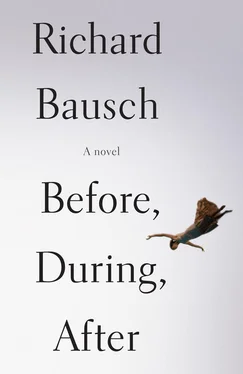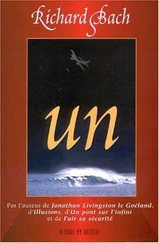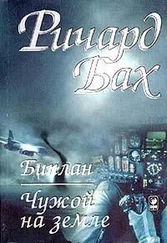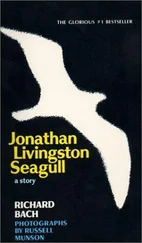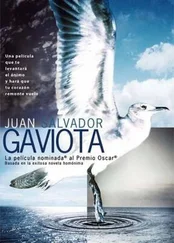“Michael,” she murmured.
“What?” the other said.
“They don’t let people in before nine-thirty. That’s the hours. You wouldn’t stay and wait for an hour. Not in New York.”
“I do not understand you,” Duego said, gazing down at her.
“Please leave me alone now.”
“One kiss?”
She let him, opened her mouth with the tactile pleasure of it. “There,” she told him. It was as though Faulk, so far away, were a child, and she belonged to the world of adults.
Duego put his mouth on hers, caressing her breasts, and then her lower abdomen, moving his hand down. His touch was insistent, and there was something hurried about it, as though he expected to be stopped or was afraid he would be. She was dizzy, eyes wide open, looking at him. His breath smelled of the dope and what he’d had to drink, and there was the thinnest displeasing redolence of fruit in it, too. She had a sensation of sudden clarity: this was actually happening. It was as though what had begun to unfold had just now become visible to her. She pushed on his shoulders as he got over on top of her.
“No,” she said. “Get off.”
His weight was stopping her breath. She protested with as much force as she could muster, and he rolled off, making a sound she thought at first was more laughter. He was crying.
“Don’t cry,” she said, and patted his arm. The little smoldering roach lay between them. She threw it off into the night, then leaned down and kissed him. The kiss lasted a long time, and he put his hands on her lower back, pulling her closer. She was falling through some field of being that was far from herself, spiraling down, a darkness born of the waste of everything that this day had been. Some part of her — off in space, despairing — watched it all, believing that she was alone, that Michael Faulk was gone, that everything was gone.
They stopped for a moment, lying there out of breath, and for a while that was the only sound — their breathing, mixed with the low roar of the surf.
When he bent to her, she put her hands on his shoulders and pushed and made the word no out of the movement of his tongue in her mouth. She pushed hard. Repeatedly. And at last he lay over on his back, making the sound she now knew was crying.
“Please go away from me,” she heard herself say. “I’m sorry to hurt your feelings, but I don’t want this. I do not want this. I’ve told you. Please. Please leave me alone.”
He didn’t answer. He was passed out, mouth open, eyes squeezed shut as if he were facing into high winds. He looked to be suffering some kind of pressure inside, the veins of his neck showing.
Getting shakily to her feet, she stumbled to the water, splashed in, and pushed out to where it was up to her thighs. Then she dove under, suffering the shock of it like a slap to her face. She swam for what seemed a long time, away from shore, into the rising and sinking surf, feeling the pull of the tide and the weight of her jeans and blouse. Suddenly the tide gripped her. The thought rose to the front of her mind that she was going to drown. She swam parallel to the beach, working it, near exhaustion, keeping on, until the ocean began to let go.
At last, turning, going under, and coming up to gasp for air, she made her way back in and reached the shallow water, where she could get to her feet, standing while the waves pulled and pushed at her knees. She coughed and sputtered, shaking, then got down in the water and urinated, looking around at the sand, the sea and sky. The water jostled her. She finished and rose and walked, splashing and reeling, out of the waves and on up toward the line of palm trees bordering the wide half circle of the beach. Lying down in the sand, still out of breath, she looked up at the moonlit clouds in the sky, the sparkle of the stars across which they sailed. It felt as though the beach were moving. She lay there shivering. In a moment, she would get up and go back to the resort, to her room, and lock the door. In a moment. But it was good here, too, being alone. The waves came in with their shuddering, murmurous whoosh, and the sound lulled her. She felt a strange, empty kind of deliverance; that nothing, finally, had taken place. She looked down the beach in the direction of where she had left Duego but couldn’t see him. Lying back, staring at the shapes in the silvery mists over the moon, she began to feel almost pleasantly sleepy.
2
The train made every stop heading south. At the Thirtieth Street Station in Philadelphia, it sat for more than an hour without any apparent cause. When Faulk asked one of the porters what was going on, the porter said, “Got me, sir.”
“Is there something wrong with the train? Has something else happened?”
“Don’t know, sir. I think maybe they waitin’ for son’thin’ down in the District.” He was very dark and had a wide mouth that looked like a cut in his lower jaw.
“Thanks — if you hear anything, I wish you’d let me know.”
“I doubt I’ll hear anything, sir. But I sure will if I do.”
“Which way is the dining car?”
“Both ways,” the porter said. “Equidistant, too.” He smiled.
“Thanks.”
“Food ain’t much good, though, I gotta tell yeh. Sammitches mostly. Process meat.”
“Well.”
The young man shook his head, wringing his hands. “Before today, I don’t know that I would’ve felt the need to tell you that.”
“I know.”
“That boggles my mind, man. You feel how different it is now?”
“Yes.”
“Maybe something good can come of this misery.”
Faulk decided to take the opposite direction from where the Asian boy had gone, believing that an encounter would produce pressure in the other for some kind of response and be a source of further unease. He stepped out into the cool vestibule and pushed the panel that would open the door into the next car. This one smelled heavily of perfume, mingled with some kind of cleanser. A man was sleeping in the first row, legs draped over the arm of the seat next to him. Two elderly women were at the far end, talking quietly, and they studied him as he passed them. The dining car was empty. At the food counter in the little vending area a middle-aged woman sat, reading a thick paperback. Her tight-curled hair was red, and many freckles dotted the light brown skin of her cheeks. There was something puffy about her face. “Hello,” she said, putting the book down.
Faulk sat at the counter. “Hello.”
“Slow trip.”
“Do you know why the delay?”
She shrugged. “Something about D.C. They got hit there, too, you know.”
“I heard.”
“You coming from Boston?”
“I got on this one in Newark. I was in New York.”
“Oh, Lord.”
“Didn’t hear a thing. I was uptown. My aunt called me about it from Washington.” He gazed toward the small window into the next car, which looked empty. “There were so many people on the train out of New York.”
“I don’t think I ever seen it this empty on this one.”
“How long have you worked here?”
“Eight years. Got the job when my husband passed. Raised four kids and never worked outside the house.”
“I’m sorry to hear about your husband.”
“Well.” She gave him a forbearing look. “Eight years ago. You notice how this kind of trouble makes you want to tell people—” She stopped and seemed to have reminded herself of something. “Well, it does me , anyway.”
“I know what you mean.” He gazed at the menu card.
“You married?” she asked.
He looked at her.
“Sorry to pry. I just feel this need today to know everybody I meet.”
“It’s fine. We’re all going through it.”
“Right. You got that one right for sure.”
Читать дальше
